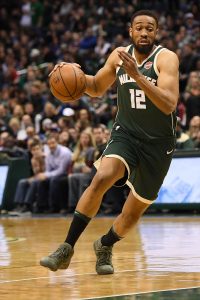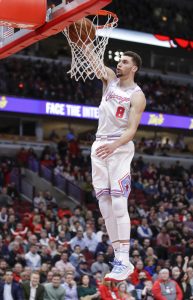Hoops Rumors is breaking down the 2018 offseason for all 30 NBA teams, revisiting the summer’s free agent signings, trades, draft picks, departures, and more. We’ll evaluate each team’s moves from the last several months and look ahead to what the 2018/19 season holds for all 30 franchises. Today, we’re focusing on the Chicago Bulls.
Signings:
- Standard contracts:

- Zach LaVine: Four years, $78MM. Matched Kings’ offer sheet. Re-signed as restricted free agent using Bird rights.
- Jabari Parker: Two years, $40MM. Second-year team option. Signed using cap space.
- Antonio Blakeney: Two years, minimum salary. Signed using minimum salary exception.
- Two-way contracts:
- Non-guaranteed camp contracts:
- Ryan Arcidiacono: One year, minimum salary. $50K guarantee.
- Derrick Walton Jr.: One year, minimum salary.
Trades:
- Acquired Julyan Stone in a three-way trade with the Hornets and Magic in exchange for Jerian Grant (to Magic).
- Note: Stone later waived.
Waiver claims:
- Claimed Antonius Cleveland off waivers from the Hawks.
Draft picks:
- 1-7: Wendell Carter — Signed to rookie contract.
- 1-22: Chandler Hutchison — Signed to rookie contract.
Departing players:
Other offseason news:
- Announced a series of promotions in basketball operations department.
Salary cap situation:
- Used cap space; now over the cap.
- Carrying approximately $102.6MM in guaranteed salaries.
- Full room exception ($4.45MM) still available.
Check out the Chicago Bulls’ full roster and depth chart at RosterResource.com.
Story of the summer:
It’s easy to forget that this time two years ago the Bulls were embarking on an ultimately futile attempt to compete within the window of Jimmy Butler‘s prime. Fast forward to today and things are about as promising as they possibly could be for a team that still won’t crack 35 wins.
What’s different about the Bulls this summer is that we’re looking back on the package John Paxson and Gar Forman landed in exchange for Butler entirely differently. Now, frankly, the fact that the club managed to yield Lauri Markkanen and Zach LaVine in exchange for their outgoing star is hard to believe, let alone incredibly underrated guard Kris Dunn as well.
Sprinkle lottery pick Wendell Carter Jr., per-minute god Bobby Portis and the No. 2 pick of the absurdly hyped 2014 draft class (who we will talk about later) and you have some serious cause for optimism. The Bulls have a roster packed with intriguing, hypothetically great assets. This is the honeymoon phase of any good rebuild.